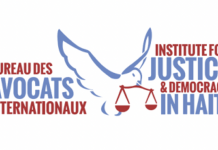By
Yves Pierre-Louis and Kim Ives (Haiti Liberte)

Yves Pierre-Louis and Kim Ives (Haiti Liberte)
On
Feb. 28, 2013, former Haitian dictator Jean-Claude “Baby Doc” Duvalier had to
show up at the Port-au-Prince Appeals Court to hear various charges against him
for crimes against humanity. After not responding to three previous summonses
in February, the former “President for
Life” had to bow to the court’s authority or risk arrest for contempt.
Feb. 28, 2013, former Haitian dictator Jean-Claude “Baby Doc” Duvalier had to
show up at the Port-au-Prince Appeals Court to hear various charges against him
for crimes against humanity. After not responding to three previous summonses
in February, the former “President for
Life” had to bow to the court’s authority or risk arrest for contempt.
Duvalier was due to report to court
again on Mar. 7, but his lawyer claims that he is sick in an unspecified
hospital.
again on Mar. 7, but his lawyer claims that he is sick in an unspecified
hospital.
Nonetheless, many suspect that the
hearings summoning Duvalier are nothing more than “show business” aimed at
rubber-stamping the Jan. 30, 2012 finding of examining magistrate Jean Carvès.
He ruled that the statue of limitations has expired for prosecuting Duvalier
for his human rights crimes. These hearings are for an appeal to overturn that
ruling.
hearings summoning Duvalier are nothing more than “show business” aimed at
rubber-stamping the Jan. 30, 2012 finding of examining magistrate Jean Carvès.
He ruled that the statue of limitations has expired for prosecuting Duvalier
for his human rights crimes. These hearings are for an appeal to overturn that
ruling.
Duvalier ruled Haiti with an iron
fist from 1971 to 1986, during which time tens of thousands were
extrajudicially killed, imprisoned, exiled, or disappeared.
fist from 1971 to 1986, during which time tens of thousands were
extrajudicially killed, imprisoned, exiled, or disappeared.
With many of his victims in the
audience, Duvalier responded to questions from members of the Court, the
prosecution, the plaintiffs, and defense counsel.
audience, Duvalier responded to questions from members of the Court, the
prosecution, the plaintiffs, and defense counsel.
When the court asked about
“repression, torture, beatings, crimes against humanity, political killings,
and human rights violations” under his regime, Duvalier dead panned that “every
time an anomaly was reported to me, I intervened so that justice could be done.
I want to stress that I sent a letter to all department commanders, to all
section chiefs, asking them to strictly apply the law around the country, and
these directives also applied to the Corps of the Volunteers for National
Security,” better known as the infamous Tontons Macoutes, who were the eyes,
ears, and fists of the Duvalier regime.
“repression, torture, beatings, crimes against humanity, political killings,
and human rights violations” under his regime, Duvalier dead panned that “every
time an anomaly was reported to me, I intervened so that justice could be done.
I want to stress that I sent a letter to all department commanders, to all
section chiefs, asking them to strictly apply the law around the country, and
these directives also applied to the Corps of the Volunteers for National
Security,” better known as the infamous Tontons Macoutes, who were the eyes,
ears, and fists of the Duvalier regime.
Asked again later about “murders,
political imprisonment, summary execution under your government, and forcing
people into exile,” Duvalier replied: “Murders exist in all countries. I did
not intervene in police activities… As for imprisonment, whenever such cases
occurred, I intervened to stop abuses being committed.”
political imprisonment, summary execution under your government, and forcing
people into exile,” Duvalier replied: “Murders exist in all countries. I did
not intervene in police activities… As for imprisonment, whenever such cases
occurred, I intervened to stop abuses being committed.”
Duvalier never betrayed a trace of
remorse or regret, arguing that “I did everything to ensure a better life for my
countrymen… I’m not saying that life was rosy, but at least people could live
decently.”
remorse or regret, arguing that “I did everything to ensure a better life for my
countrymen… I’m not saying that life was rosy, but at least people could live
decently.”
He claims that he on his return, “I
found a ruined country, with boundless corruption that hinders the development
of this country. And on my return, it’s my turn to ask: what have you done to
my country?”
found a ruined country, with boundless corruption that hinders the development
of this country. And on my return, it’s my turn to ask: what have you done to
my country?”
He suggested that he was close to
journalist Jean Léopold Dominique (slain in 2000), “who accompanied me often in
my inspections in the province” and that he helped Dominique obtain his radio
station, Radio Haïti.
journalist Jean Léopold Dominique (slain in 2000), “who accompanied me often in
my inspections in the province” and that he helped Dominique obtain his radio
station, Radio Haïti.
Former soccer star Robert “Bobby”
Duval, the founder of the Haitian League of Former Political Prisoners (LAPPH),
was also in the courtroom as one of the plaintiffs appealing Judge Carvès
Jean’s ruling. Duval spent 17 months imprisoned in the infamous Fort Dimanche
prison without charges. But Duvalier claimed that Duval “was arrested for
subversive activities,” saying that “during a search at the François Duvalier
airport, we found weapons in his possession and he was released a few years
later by an act of clemency by the Head of State.” Duvalier claimed that
Duval’s suit against him “is a real joke” and that Duval “was treated well” and
that “a family member brought him food three times a day.”
Duval, the founder of the Haitian League of Former Political Prisoners (LAPPH),
was also in the courtroom as one of the plaintiffs appealing Judge Carvès
Jean’s ruling. Duval spent 17 months imprisoned in the infamous Fort Dimanche
prison without charges. But Duvalier claimed that Duval “was arrested for
subversive activities,” saying that “during a search at the François Duvalier
airport, we found weapons in his possession and he was released a few years
later by an act of clemency by the Head of State.” Duvalier claimed that
Duval’s suit against him “is a real joke” and that Duval “was treated well” and
that “a family member brought him food three times a day.”
Asked what he thought about the
charges against him, Duvalier said “it makes me laugh” because people are just
“inventing fantasies.”
charges against him, Duvalier said “it makes me laugh” because people are just
“inventing fantasies.”
The hearing lasted more than three
hours, after which Duvalier’s victims and representatives of human rights
organizations said they were satisfied and encouraged that the Appeals Court
judges were not intimidated by government pressure. They said they felt more
determined than ever to talk about the suffering and torment caused by the
murder, imprisonment, disappearances, and other crimes committed under
Duvalier’s dictatorship. They were also galled by Baby Doc’s contemptuous
attitude during the hearing.
hours, after which Duvalier’s victims and representatives of human rights
organizations said they were satisfied and encouraged that the Appeals Court
judges were not intimidated by government pressure. They said they felt more
determined than ever to talk about the suffering and torment caused by the
murder, imprisonment, disappearances, and other crimes committed under
Duvalier’s dictatorship. They were also galled by Baby Doc’s contemptuous
attitude during the hearing.
After the hearing, Bobby Duval
scoffed at Duvalier’s assertion that he had been arrested for illegal
possession of firearms. Of the 13 Haitian political prisoners whom Amnesty
International championed at that time in the late 1970s, Duval is one of the
three survivors. “Their goal was to kill me,” he said, adding that he
would not have survived much longer in prison.
scoffed at Duvalier’s assertion that he had been arrested for illegal
possession of firearms. Of the 13 Haitian political prisoners whom Amnesty
International championed at that time in the late 1970s, Duval is one of the
three survivors. “Their goal was to kill me,” he said, adding that he
would not have survived much longer in prison.
Henry Faustin was another former
political prisoner who attended the trial. Arrested on Jun. 15, 1976, Faustin
spent two months in a dungeon in the Dessalines Barracks (other political
prison under Duvalier, located behind the National Palace). Only 20 years old,
Faustin was then transferred for another 16 months (until December 1977) to
Fort Dimanche. “Fort Dimanche was not child’s play,” he said. “You arrived
there as a prisoner, with clothes, but then they stripped you naked as a
worm.”
political prisoner who attended the trial. Arrested on Jun. 15, 1976, Faustin
spent two months in a dungeon in the Dessalines Barracks (other political
prison under Duvalier, located behind the National Palace). Only 20 years old,
Faustin was then transferred for another 16 months (until December 1977) to
Fort Dimanche. “Fort Dimanche was not child’s play,” he said. “You arrived
there as a prisoner, with clothes, but then they stripped you naked as a
worm.”
International human rights
organizations are following the Duvalier hearings closely. “If someone like
Duvalier is not judged, how can one judge someone who has stolen a chicken to
feed his family?” asked Reed Brody of Human Rights Watch. “How do you establish
the rule of law when he who is accused of the worst crimes gets away with it?
But Haiti has always been considered an exception. Moreover it is interesting
to see that the big countries like France and the United States have never
requested that Duvalier be tried, because they have disdain for Haiti. Haiti is
not entitled to justice. It’s good enough if Haiti just gets a little to eat,
or if the population has a little shelter. They don’t make the link between the
lack of justice for the vast majority and the lack of social justice as
well.”
organizations are following the Duvalier hearings closely. “If someone like
Duvalier is not judged, how can one judge someone who has stolen a chicken to
feed his family?” asked Reed Brody of Human Rights Watch. “How do you establish
the rule of law when he who is accused of the worst crimes gets away with it?
But Haiti has always been considered an exception. Moreover it is interesting
to see that the big countries like France and the United States have never
requested that Duvalier be tried, because they have disdain for Haiti. Haiti is
not entitled to justice. It’s good enough if Haiti just gets a little to eat,
or if the population has a little shelter. They don’t make the link between the
lack of justice for the vast majority and the lack of social justice as
well.”
Former dictator Jean-Claude Duvalier was
contemptuous and arrogant when responding to questions in the first hearing
into his human rights abuses.
contemptuous and arrogant when responding to questions in the first hearing
into his human rights abuses.





